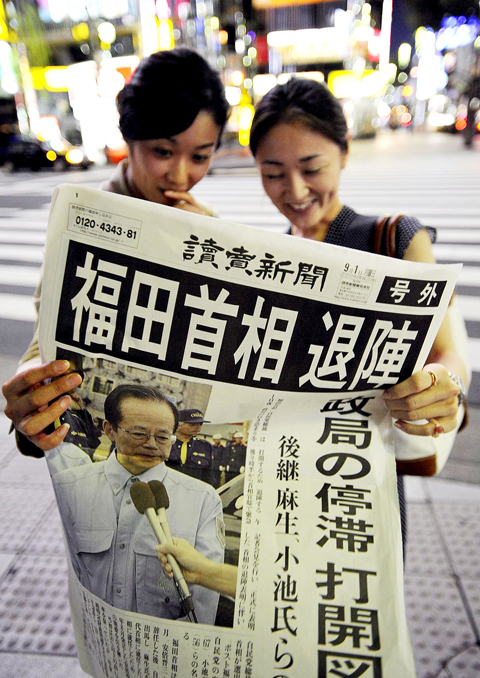Asia’s largest economy was left rudderless again yesterday after Japan’s prime minister quit suddenly, sparking concerns that free-market reforms will be put on a backburner as a recession looms.
There was a weary sense of deja vu on financial markets, as the return of the revolving door politics of the recession-ridden 1990s left the country searching for its third prime minister in less than two years.
Whoever replaces Yasuo Fukuda will inherit the same problems — a deadlocked parliament, a worsening economy, an ageing population and huge public debts.

PHOTO: EPA
The Nikkei stock index ended down 1.75 percent while the yen was higher.
“The political uncertainty may add volatility to the market in the short term,” warned Kenichi Kawasaki, chief economist for Lehman Brothers in Tokyo.
“However, we do not expect economic policies to change significantly as a result of a change in the prime minister,” he said, predicting the ruling party could be forced to hold an autumn general election.
Fukuda’s surprise announcement late on Monday came after he failed to reverse a slump in his popularity despite unveiling a major economic stimulus package.
Many investors had already been disillusioned about the prospects for further economic reform given the legislative deadlock and signs that the ruling party is more concerned about the next election.
“There is already political deadlock and elections are expected in the coming year,” said Kazuhiro Takahashi, head of equities at Daiwa Securities SMBC.
Former foreign minister Taro Aso, seen by many as the front-runner to replace Fukuda, would be likely to push for increased government spending to support the economy if he takes office, analysts said.
Aso would “appeal for an increase in budget-spending to support economic activity,” predicted John Richards, head of Asia-Pacific Strategy at RBS Securities.
Until recently, Japan’s economy had been recovering from a slump stretching back more than a decade. But a contraction in the second quarter left the country teetering on the brink of recession.
Some experts said the change of leadership could be positive in the long run if it helps to bring about a realignment of Japanese political forces, with reform-minded politicians taking power.
Fukuda’s resignation “will be a disruption for Japanese politics and markets in the short run, but provide support in the medium to long run,” Morgan Stanley economists wrote in a note to clients.
Reform efforts lost momentum after Junichiro Koizumi stepped down as premier two years ago.
He set out to slash public works spending and break up the post office with its US$3 trillion in assets, which were used to bankroll often wasteful but politically popular public works projects.
The political stalemate has heightened nostalgia on the market for Koizumi, although observers say chances are low he would mount a comeback.

MORE VISITORS: The Tourism Administration said that it is seeing positive prospects in its efforts to expand the tourism market in North America and Europe Taiwan has been ranked as the cheapest place in the world to travel to this year, based on a list recommended by NerdWallet. The San Francisco-based personal finance company said that Taiwan topped the list of 16 nations it chose for budget travelers because US tourists do not need visas and travelers can easily have a good meal for less than US$10. A bus ride in Taipei costs just under US$0.50, while subway rides start at US$0.60, the firm said, adding that public transportation in Taiwan is easy to navigate. The firm also called Taiwan a “food lover’s paradise,” citing inexpensive breakfast stalls

TRADE: A mandatory declaration of origin for manufactured goods bound for the US is to take effect on May 7 to block China from exploiting Taiwan’s trade channels All products manufactured in Taiwan and exported to the US must include a signed declaration of origin starting on May 7, the Bureau of Foreign Trade announced yesterday. US President Donald Trump on April 2 imposed a 32 percent tariff on imports from Taiwan, but one week later announced a 90-day pause on its implementation. However, a universal 10 percent tariff was immediately applied to most imports from around the world. On April 12, the Trump administration further exempted computers, smartphones and semiconductors from the new tariffs. In response, President William Lai’s (賴清德) administration has introduced a series of countermeasures to support affected

CROSS-STRAIT: The vast majority of Taiwanese support maintaining the ‘status quo,’ while concern is rising about Beijing’s influence operations More than eight out of 10 Taiwanese reject Beijing’s “one country, two systems” framework for cross-strait relations, according to a survey released by the Mainland Affairs Council (MAC) on Thursday. The MAC’s latest quarterly survey found that 84.4 percent of respondents opposed Beijing’s “one country, two systems” formula for handling cross-strait relations — a figure consistent with past polling. Over the past three years, opposition to the framework has remained high, ranging from a low of 83.6 percent in April 2023 to a peak of 89.6 percent in April last year. In the most recent poll, 82.5 percent also rejected China’s

PLUGGING HOLES: The amendments would bring the legislation in line with systems found in other countries such as Japan and the US, Legislator Chen Kuan-ting said Democratic Progressive Party (DPP) Legislator Chen Kuan-ting (陳冠廷) has proposed amending national security legislation amid a spate of espionage cases. Potential gaps in security vetting procedures for personnel with access to sensitive information prompted him to propose the amendments, which would introduce changes to Article 14 of the Classified National Security Information Protection Act (國家機密保護法), Chen said yesterday. The proposal, which aims to enhance interagency vetting procedures and reduce the risk of classified information leaks, would establish a comprehensive security clearance system in Taiwan, he said. The amendment would require character and loyalty checks for civil servants and intelligence personnel prior to